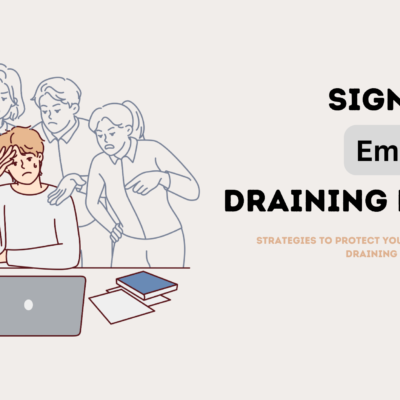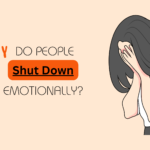Signs of an Emotionally Draining Person: Handling relationships can be both fulfilling and challenging. While some relationships bring joy, support, and positivity into our lives, others can leave us feeling emotionally drained and exhausted. One common source of feeling emotionally drained is interacting with people who possess specific traits and behaviors that drain our energy and leave us feeling tired.
So, in this article, we will talk about the signs of an emotionally draining person and also we will provide strategies for protecting your emotions in such relationships.
Also Read:
- Why Do People Shut Down Emotionally?
- How to Stop Missing Someone?
- Common Myths About OCD.
- Tips for Recognizing Emotions.
- How to Cope with Unresolved Trauma?
Signs of an Emotionally Draining Person
Continuous Negativity
One of the most visible signs of an emotionally exhausting person is their preference to concentrate on the negative parts of life. They may often complain, criticize others, and see situations from a negative viewpoint. Being around such people can leave you feeling drained and frustrated, as their negativity can be transferable.
Self-Centeredness
Emotionally draining people usually show self-centered behavior, where they prioritize their own needs, wants, and interests above those of others. They may overlook conversations, continually seek attention and validation, and show little interest in listening to others. This self-absorption can leave you feeling overlooked and less important in the relationship.
Drama and Conflict
Emotionally draining people tend to create a lot of drama and conflict. They may usually create situations that lead to tension, arguments, and stress. Dealing with their continuous drama can be exhausting and emotionally draining, as it diverts from more meaningful and positive interactions.
Manipulative Tactics
Another sign of an emotionally draining person is their use of manipulative tactics to control or influence others. They may guilt-trip, gaslight, or emotionally influence those around them to get their way or fulfill their requirements. Recognizing and fighting these manipulative behaviors can be draining and damaging to your well-being.
Emotional Volatility
Emotionally draining people may display unpredictable emotions. They may experience regular mood swings, which may differ from intense anger or frustration to sudden episodes of sadness or despair. Dealing with their emotional instability can be exhausting and challenging, as you may never know how they will react in any given circumstances.
Lack of Boundaries
Emotionally draining people usually have poor boundaries, both in terms of respecting others’ boundaries and holding their own. They may disturb your personal space, ignore your need for alone time or privacy, and exceed your emotional boundaries by sharing too much personal information or making unacceptable needs on your time and energy.
Energy Vampire
A classic indication of an emotionally draining person is their ability to drain your energy and leave you feeling exhausted after interacting with them. They may demand your time and attention necessary, leaving you with little energy for other activities or relationships
Chronic Victim Mentality
Emotionally draining people usually adopt a chronic victim mentality, where they see themselves as victims of situations that are beyond their control. They may blame others for their problems, refuse to take accountability for their actions, and continually seek sympathy and validation from those around them. Dealing with their continuous victimhood can be draining and frustrating, as it feels like you are always walking on eggshells around them.
Emotional Dependency
Emotionally draining people may display signs of emotional dependency, depending heavily on others for validation, support, and reassurance. They may cling to you for emotional stability, continuously seeking your approval and validation to feel confident in themselves. This emotional neediness can be exhausting and suffocating, as it creates a one-sided dynamic where you feel accountable for their emotional well-being.
Unwillingness to Change
Despite your actions to communicate your requirements and boundaries, emotionally draining people may show little readiness to change their behavior or improve the relationship. They may oppose feedback, deflect responsibility for their actions, and make reasons for their behavior rather than taking aggressive steps to handle the underlying issues. Dealing with their resistance to change can be exhausting and disheartening.
Strategies to Protect You from Emotionally Draining People
Set Boundaries
Set clear and firm boundaries with emotionally draining people to protect your well-being. Communicate your limits and implement outcomes if they continue to break your boundaries. Remember that it is not selfish to prioritize your own needs in a relationship.
Limit Contact
If possible, limit your exposure to emotionally draining people to relieve the impact of their negativity on your life. Set boundaries around how frequently you interact with them and make supportive relationships that uplift and energize you.
Practice Self-Care
Invest time and energy into self-care practices that fill your emotional and mental resources. Engage in activities that bring you joy and relaxation, such as exercise, meditation, hobbies, and spending time with loved ones who support you.
Seek Support
Reach out to friends, family members, or a therapist for support and validation if you are struggling to deal with an emotionally draining person. Having a supportive network can help you handle difficult relationships and support your emotional well-being.
Develop Managing Strategies
Develop coping strategies to handle your response to emotionally draining people. Practice mindfulness techniques to stay grounded in the present moment, use positive self-talk to counteract negativity and employ strong communication skills to communicate your needs and boundaries.
Focus on What You Can Control
Concentrate on what you can control in the relationship, such as setting boundaries, practicing self-care, and choosing how you react to their behavior. Accept that you cannot change the other person and prioritize your mental health instead of trying to fix them.
Seek Distance (if Necessary)
In some cases, it may be necessary to create physical or emotional distance from an emotionally draining person for your health. Trust your intuitions and prioritize your own mental and emotional health above keeping the relationship at all costs.
At The End
Identifying the signs of an emotionally draining person is the first step toward saving your well-being in relationships. By identifying these behaviors and executing strategies to deal with them, you can create healthier boundaries, develop supportive connections, and prioritize your own emotional and mental health.
Remember that it is not selfish to prioritize yourself in relationships, and you deserve to surround yourself with people who uplift and energize you instead of drain your energy.








